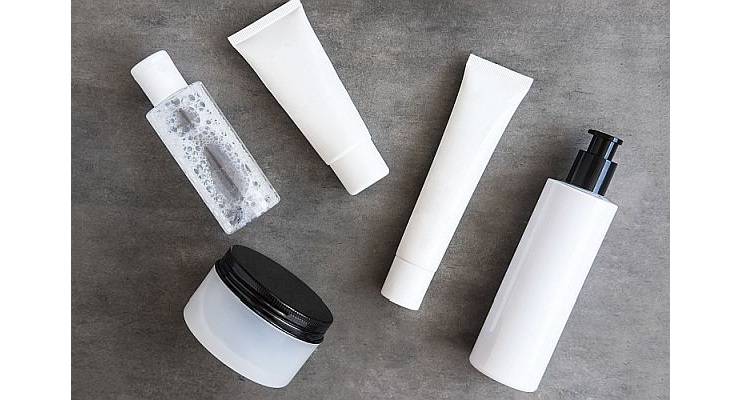A question cosmetics formulator and ethnobotanist, Sheila Gray, is asking Indian cosmetics brands.
◊ By Sheila Gray
Visit ORGANIC SHOP by Pure & Eco India
Over the last decade, I’ve witnessed the development of the organic movement in India with great enthusiasm. More and more of us are engaging in a healthier lifestyle, choosing to feed our families organic food, supporting small farmers to convert to organic agriculture, and opting for organic cotton over the human and ecological disaster of GM cotton.
But what about organic cosmetics? “Mmm, well yes,” I can hear you say. “I do try to buy natural or ayurvedic products whenever I can, but after all it’s not that important, is it? We don’t actually eat them do we?”
Well actually, yes we do. To begin with, the skin is the largest organ of our bodies and over 60% of the ingredients that we use on our skin or scalp are absorbed into our systems. Yes, 60%, incredible isn’t it? In the case of lipsticks, lip balms or face creams, the problem is even more serious, as it has been calculated that simply by licking our lips, we are actually eating an average of a whopping 3.2 kg of these products over a lifetime!
In India, cosmetics companies are under no legal obligation to provide consumers with information on the ingredients used in their products.
Beautiful ‘KEY INGREDIENTS’ are given on company packaging and websites, which include a list of appealing ayurvedic plant names and luxurious, healthy sounding oils and butters, but no mention of which petroleum-derived emulsifiers and stabilisers are used in their creams and lotions to prevent them from separating, and definitely no mention of which chemical preservatives are used to prevent bacterial or fungal contamination. And what about that heady perfume? Which cheap, synthetic chemical compounds have been added along with the ubiquitous Jasmine, Rose, Tulsi or Sandalwood invariably mentioned on labels?
Conventional or non organic cosmetics contain dangerous chemical preservatives such as parabens, phenoxyethanol and methylisothiazolinone, along with synthetic chemical perfumes, mineral oils and silicones, and in the case of lipsticks, high percentages of heavy metals including lead and cadmium—that’s quite a chemical cocktail that we’re unwittingly consuming daily, along with our organic veggies!
So, what about our ‘organic’ choices for cleansing and caring for our hair and skin?
EU COSMETICS COS. MANDATED TO REVEAL FULL INGREDIENTS LIST
In Europe, thanks to the efforts of a growing number of organic protagonists over the last 20 years, organic certification regulation for cosmetics is the most stringent worldwide, even more so since the implementation of the COSMOS Standard in 2017, which encompasses 5 previous European labels: BDIH (Germany), Cosmebio (France), Ecocert Greenlife (France), ICEA (Italy) and Soil Association (UK). More information regarding this can be found on www.cosmos-standard.org.
Both COSMOS Organic and COSMOS Natural guarantee that cosmetic products adhering to the labels are manufactured according to strict environmental principles using clean manufacturing processes, which comply with the principles of environmentally friendly ‘Green Chemistry’. Harmful chemicals, synthetic perfumes and chemical colours are banished and packaging must be recyclable, with minimum impact on the environment.
In addition, the COSMOS Organic label requires that at least 95% of the botanical extracts in a cosmetic product must be certified organic and that the minimum percentage of organic ingredients in a finished product must be at least 20%. But in my opinion, the major step forward for consumers in Europe and the US happened in 1999.
Let me explain. I have been creating organic cosmetics and teaching organic cosmetics formulation to the public and professionals alike for almost 30 years. During that time I have regularly campaigned for greater transparency concerning information supplied by cosmetic companies on the ingredients they use in their products.
In 1999, all cosmetic companies in Europe and the US (organically certified or not), came under legal obligation to print clearly an INCI (International Nomenclature of Cosmetic Ingredients) list of every single ingredient on the packaging of each cosmetic product on the market. This means absolutely every ingredient, not just the pretty sounding botanicals but also the nasty chemicals and controversial ingredients that, let’s face it, many cosmetic companies would prefer us not to know about!
An INCI list demands that in order to avoid any confusion or misidentification concerning common plant names, botanical ingredients must be written in Latin and chemical ingredients are referenced by a uniform name. This ensures that both the cosmetic industry and consumers are able to track the safety and the regulatory status of ingredients efficiently on a global basis.
Furthermore, all the ingredients must be listed in descending order of weight. Quite often the ingredient at the top of the list will be AQUA (water), which can represent up to 80% or even 90% of a product, whilst those high profile botanicals will often end up at the bottom of the list representing less than 1%. Thus, the public are informed and aware of what they are buying.
LACK OF LEGAL OBLIGATION IN INDIA LEADING TO SMOKE & MIRRORS LABELLING
Unfortunately, the situation in India is very different. Here, cosmetics companies are under no legal obligation to provide consumers with information on the ingredients used in their products.
Of course, beautiful ‘KEY INGREDIENTS’ are given a high profile on company packaging and websites, which include a list of appealing ayurvedic plant names and luxurious, healthy sounding oils and butters, but strangely enough, no mention of which petroleum derived emulsifiers and stabilisers are used in their creams and lotions to prevent them from separating, and definitely no mention of which chemical preservatives are used to prevent bacterial or fungal contamination.
And what about that heady perfume? Which cheap, synthetic chemical compounds have been added along with the ubiquitous Jasmine, Rose, Tulsi or Sandalwood invariably mentioned on labels?
Moreover, many Indian cosmetic brands freely use the terms ‘Organic’, ‘Herbal’, ‘Natural’ and ‘Ayurvedic’, with no guarantee whatsoever for consumers, who are left completely in the dark concerning the full list of ingredients in a product.
In my quest to find answers, I contacted the consumer services of several “Natural /Ayurvedic/ Organic” cosmetic brands in India including Forest Essentials, Jovees, Biotique, Indus Valley and Himalaya Herbals, in an attempt to find out exactly what their “Pure, Natural, Organic” products contain and more importantly, exactly what ingredients we as consumers were absorbing into our systems.
Most companies didn’t reply, but those that did invariably supplied me with information that as a professional, I could easily recognise as incomplete.
One very prominent skincare company claims about its ‘organic’ oil: “Powered with distinguished great ingredients from across the globe like Shea butter from Africa, Lavender oil from France, Apricot Kernel oil from Europe to make it the most effective oil for skin care. Neroli, Pachouli oil from India add to its Ayurvedic benefits. This is enriched with Vitamin E and A, Geranium oil to give you a youthful, blissful and healthy looking skin.”
However, after detailed research I discovered that the main ingredients which make up at least 80% of this product are synthetic and petroleum-derived mineral oils (paraffin oil, isopropyl myristate), both considered occlusive and damaging the skin in the long term; refined soya oil (no guarantee it’s not GM) and refined sunflower oil. Moreover, this product contains BHT (butylated hydroxytoluene), a hormone disruptor and toxic element, which has been proven to cross the skin barrier into our systems. It is unclear if the remaining ingredients are certified organic.
So what can consumers in India do about this situation? I would definitely suggest pressuring cosmetic companies to supply clear and complete ingredients lists both on their labels and websites before buying their products. Hopefully they will get the message.
In the meantime, supporting some of the small ethical niche brands is an alternative. Examples of such brands are Ma Earth Botanicals, Organic Harvest, BioBloom, Dear Earth, Just Herbs or BON, to name but a few, but unfortunately even these small independent brands don’t deem it necessary to supply their customers with complete ingredient lists.
I have, in fact, only been able to find two brands worth mentioning for their clear information and quality products: Rustic Art and SoulTree. It really isn’t good enough. Let’s strive for more transparency from Indian cosmetic companies and an end to greenwashing. I hope that your consumer power will make a change to the situation. It’s up to you!
ABOUT THE AUTHOR

The author is an independent cosmetics formulator and ethnobotanist based in France. A pioneer of the organic cosmetics movement, she has spent 10 years teaching the principles of formulating natural and organic products to professionals. For the last 20 years she has dedicated her time to working with small farming communities and women’s Self Help Groups in remote India—mainly in the Himalayas and the Western Ghats—to establish income generation projects for the organic cultivation and wild harvest of ayurvedic plants, which she also uses in her own brand of ethical organic cosmetics, Pur & Simple. Gray is actively involved in the conservation of medicinal plants and traditional health practices in India, where she works in collaboration with various NGOs.



Rustic Art is awesome but love Juicy Chemistry too. You guys should cover them too. They’re legit.
Which is the company that you’re alluding to? The one that was lying..
What do you mean? At least she spoke about the fake brands.
Kudos for writing this. This definitely had to be said. Thank you for speaking out on our behalf. In one of my pursuits of reaching out to a self proclaimed organic company about ingredients, they told me I have too much free time and that they’re adding me to spam. What a way to deal with conscious customers!
I think you missed out on the brand Juicy Chemistry. They are doing an awesome job and definitely provide a ray of hope for us.
In tamilnadu, so many people started organic pages but those pages are not actually organic. They mentioned certified organic but there is no certified symbol on their product labels. And they’re editing before and after picture. These people are so tricky and cruel minded to gain money. Many of them don’t know about these fraud activities done by them. And they’re buying. If the customers give any negative feedback. The duplicate certified Organic brand deleting and blocking their accounts. Their products are not dermatologically tested and approve. They’re just making a product and testing on their fellow family members. If it worked out for them. So many people are being cheated by them. People do not have any awareness among the beauty brand which they’re using, how trickly they’ve being cheated. It’s not the mistake of people.
Could you check please out Formularx, BeMinimalist and Earthrythm?